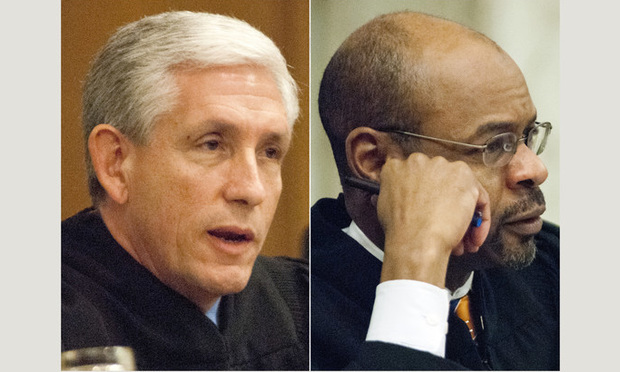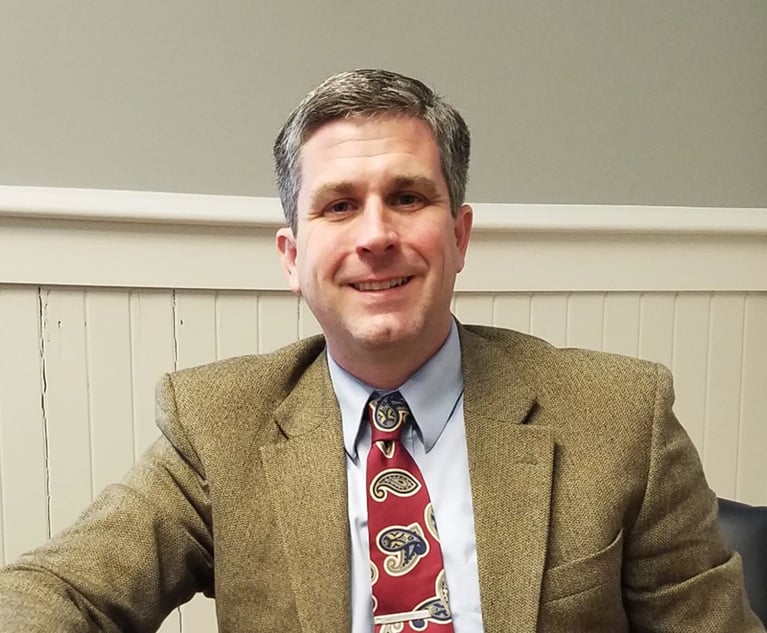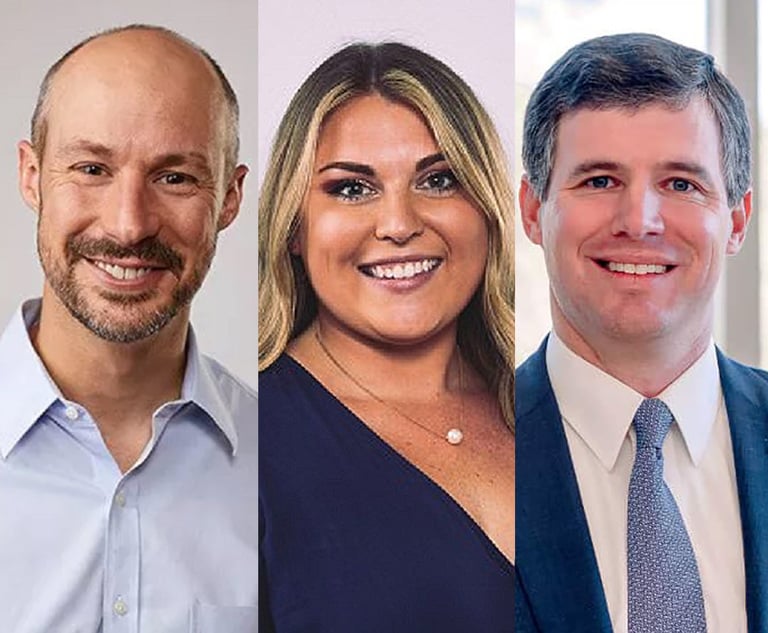'Let Justice Be Done': Georgia Justices Question AG's Fight Over New Murder Trial
"The Attorney General should decide whether it is really in the interest of justice for the State of Georgia to continue fighting to block discovery," Nahmias wrote.
September 19, 2019 at 01:58 PM
4 minute read
 Presiding Justice David Nahmias (left) and Chief Justice Harold Melton, Supreme Court of Georgia. (Photos: John Disney/ALM)
Presiding Justice David Nahmias (left) and Chief Justice Harold Melton, Supreme Court of Georgia. (Photos: John Disney/ALM)
The chief justice and presiding justice of the Supreme Court of Georgia Thursday called on the state attorney general to consider dropping a fight against a murder convict seeking a new trial based on new DNA evidence.
The case of Devonia Tyrone Inman "is the one that causes me the most concern that an innocent person remains convicted and sentenced to serve the rest of his life in prison," wrote Presiding Justice David Nahmias, referring to more than 1,500 murder cases he has reviewed in 10 years on the court.
He was concurring with the court's decision to allow Inman's habeas corpus challenge to move forward.
"The Attorney General should decide whether it is really in the interest of justice for the State of Georgia to continue fighting to block discovery regarding Inman's claims and asserting procedural defenses to prevent a hearing on the merits of those claims," Nahmias added.
"Let justice be done," Nahmias concluded.
Chief Justice Harold Melton echoed Nahmias' concerns, adding that Attorney General Chris Carr "is now in a better position than this Court to re-examine this case to ensure that the actual ends of justices are being met."
Carr's spokeswoman said Thursday that the AG and his senior staff "take very seriously the court's concerns and are personally and fully reviewing the matter in conjunction with the district attorney who would be responsible for any prosecution arising out of this case."
The prosecutor, Dick Perryman of the Alapaha Circuit, could not be reached.
Last month, the state asked the Supreme Court to let it submit an early appeal to a trial judge's rejection of the state's motion to dismiss Inman's habeas case. The state argued that four of Inman's five grounds "are clearly untimely, and the fifth, even if timely, is precluded from relitigation."
Inman, who was sentenced to life imprisonment for the 1998 shooting death and robbery of a restaurant manager, claims that DNA evidence found on a homemade mask in the victim's car belongs to a different man.
That second man is now serving his own life-without-parole sentence for killing two people during a botched robbery in 2000, according to The Atlanta Journal-Constitution.
Backed by this evidence, Inman, represented by lawyers at Troutman Sanders, challenged his conviction and had survived the state's motion to dismiss.
"I've never seen anything like it," said Tom Reilly, the business litigation partner at Troutman who is lead counsel on the pro bono matter, referring to Nahmias' and Melton's comments.
He's worked on the case with colleagues David Chaiken and Tiffany Nichols Bracewell, who work on government investigations, and intellectual property associate Majda Muhic. They were referred the case from The Innocence Project, which helps inmates challenge convictions.
Reilly said Nahmias "courageously" admitted regretting the court's rejection of Inman's application for a discretionary appeal in 2014.
Both Melton and Nahmias highlighted the limits of the court's role, with Nahmias writing that judges "are often obligated to enforce procedural rules" while prosecutors "may always exercise their discretion to seek justice—to do the right thing."
The court's former chief justice, Leah Ward Sears, read the concurrences on Thursday and noted that Melton and Nahmias are "fairly conservative jurists who believe deeply in the separation of powers."
Now a partner at Smith, Gambrell & Russell, Sears suggested both "seem to be asking the executive branch to look into this matter in what is, really, a set of rare writings on behalf of the defendant and, justice really. Not all judges or justices would see it this way (i.e., that they have no power to act), but I do understand their approach, especially given their judicial philosophy."
Read the order:
This content has been archived. It is available through our partners, LexisNexis® and Bloomberg Law.
To view this content, please continue to their sites.
Not a Lexis Subscriber?
Subscribe Now
Not a Bloomberg Law Subscriber?
Subscribe Now
NOT FOR REPRINT
© 2025 ALM Global, LLC, All Rights Reserved. Request academic re-use from www.copyright.com. All other uses, submit a request to [email protected]. For more information visit Asset & Logo Licensing.
You Might Like
View All

DC Lawsuits Seek to Prevent Mass Firings and Public Naming of FBI Agents
3 minute read

Apply Now: Superior Court Judge Sought for Mountain Judicial Circuit Bench
3 minute readTrending Stories
Who Got The Work
J. Brugh Lower of Gibbons has entered an appearance for industrial equipment supplier Devco Corporation in a pending trademark infringement lawsuit. The suit, accusing the defendant of selling knock-off Graco products, was filed Dec. 18 in New Jersey District Court by Rivkin Radler on behalf of Graco Inc. and Graco Minnesota. The case, assigned to U.S. District Judge Zahid N. Quraishi, is 3:24-cv-11294, Graco Inc. et al v. Devco Corporation.
Who Got The Work
Rebecca Maller-Stein and Kent A. Yalowitz of Arnold & Porter Kaye Scholer have entered their appearances for Hanaco Venture Capital and its executives, Lior Prosor and David Frankel, in a pending securities lawsuit. The action, filed on Dec. 24 in New York Southern District Court by Zell, Aron & Co. on behalf of Goldeneye Advisors, accuses the defendants of negligently and fraudulently managing the plaintiff's $1 million investment. The case, assigned to U.S. District Judge Vernon S. Broderick, is 1:24-cv-09918, Goldeneye Advisors, LLC v. Hanaco Venture Capital, Ltd. et al.
Who Got The Work
Attorneys from A&O Shearman has stepped in as defense counsel for Toronto-Dominion Bank and other defendants in a pending securities class action. The suit, filed Dec. 11 in New York Southern District Court by Bleichmar Fonti & Auld, accuses the defendants of concealing the bank's 'pervasive' deficiencies in regards to its compliance with the Bank Secrecy Act and the quality of its anti-money laundering controls. The case, assigned to U.S. District Judge Arun Subramanian, is 1:24-cv-09445, Gonzalez v. The Toronto-Dominion Bank et al.
Who Got The Work
Crown Castle International, a Pennsylvania company providing shared communications infrastructure, has turned to Luke D. Wolf of Gordon Rees Scully Mansukhani to fend off a pending breach-of-contract lawsuit. The court action, filed Nov. 25 in Michigan Eastern District Court by Hooper Hathaway PC on behalf of The Town Residences LLC, accuses Crown Castle of failing to transfer approximately $30,000 in utility payments from T-Mobile in breach of a roof-top lease and assignment agreement. The case, assigned to U.S. District Judge Susan K. Declercq, is 2:24-cv-13131, The Town Residences LLC v. T-Mobile US, Inc. et al.
Who Got The Work
Wilfred P. Coronato and Daniel M. Schwartz of McCarter & English have stepped in as defense counsel to Electrolux Home Products Inc. in a pending product liability lawsuit. The court action, filed Nov. 26 in New York Eastern District Court by Poulos Lopiccolo PC and Nagel Rice LLP on behalf of David Stern, alleges that the defendant's refrigerators’ drawers and shelving repeatedly break and fall apart within months after purchase. The case, assigned to U.S. District Judge Joan M. Azrack, is 2:24-cv-08204, Stern v. Electrolux Home Products, Inc.
Featured Firms
Law Offices of Gary Martin Hays & Associates, P.C.
(470) 294-1674
Law Offices of Mark E. Salomone
(857) 444-6468
Smith & Hassler
(713) 739-1250






